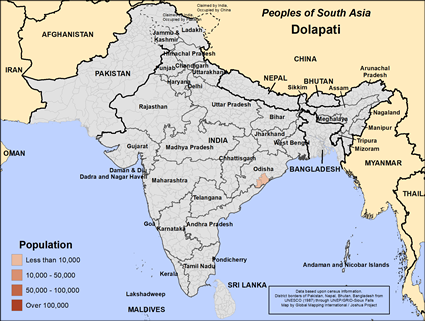The Dolapati people trace their roots back several centuries. They have traditionally engaged in agriculture and fishing, contributing significantly to the local economy. The Dolapati primarily speak Odia, the language of their home state of Odisha.
Today, the Dolapati people live in rural villages, focusing on farming and fishing. They cultivate crops such as rice, lentils, and vegetables and many families also rely on fishing from nearby rivers and lakes. Their communities are close-knit, emphasizing strong family bonds and mutual support. In their spare time the Dolapati enjoy festivals, music and traditional arts.
The Dolapati people distinguish themselves from other groups through their unique combination of agricultural and fishing practices. Their knowledge of farming techniques and sustainable fishing methods sets them apart. The Dolapati place a strong emphasis on maintaining family unity.
The Dolapati diet includes both vegetarian and non-vegetarian food, featuring rice, lentils, vegetables and fish. They enjoy traditional dishes such as fish curry and pithas (rice cakes) during festive occasions. Their culinary practices emphasize the use of locally available ingredients, reflecting their cultural and regional preferences.
Their wedding practices are elaborate and rooted in Hindu traditions. Weddings typically include Hindu rituals such as the exchange of garlands, sacred fire ceremonies, religious music and dance productions.
The Dolapati people practice Hinduism, worshiping various deities and observing numerous religious rituals and festivals such as Diwali, Rath Yatra and Durga Puja. Their belief system emphasizes values like dharma (duty), karma (actions and consequences), and ahimsa (non-violence). They honor their ancestors through rituals and ceremonies, ensuring the transmission of their religious and cultural traditions across generations.
The Dolapati people need better access to quality education to provide more opportunities for their children. Improved healthcare services are essential due to limited availability of medical facilities and high rates of preventable diseases. Economic support through modern agricultural techniques, sustainable fishing practices, market access, and vocational training can enhance their livelihoods. Infrastructure development, including better roads, clean water supplies, and reliable electricity, will greatly benefit the Dolapati community. Addressing these needs will help the Dolapati people achieve greater socio-economic stability while preserving their rich cultural and religious heritage.
Pray for the Lord to give Dolapati farmers a record harvest as a testimony of his goodness and power.
Pray for discipleship efforts and evangelistic communities in their communities and families.
Pray for the Dolapati people to see and understand living Christianity.
May they crave the Holy Spirit in their communities.
Scripture Prayers for the Dolapati in India.
Cultural Traditions of Odisha, Ministry of Culture, Government of India, 2017.
Sharma, B.K., "Agricultural and Fishing Practices in Eastern India," Mittal Publications, 2012.
"Rural Development in Odisha," Ministry of Rural Development, Governme
| Profile Source: Joshua Project |











